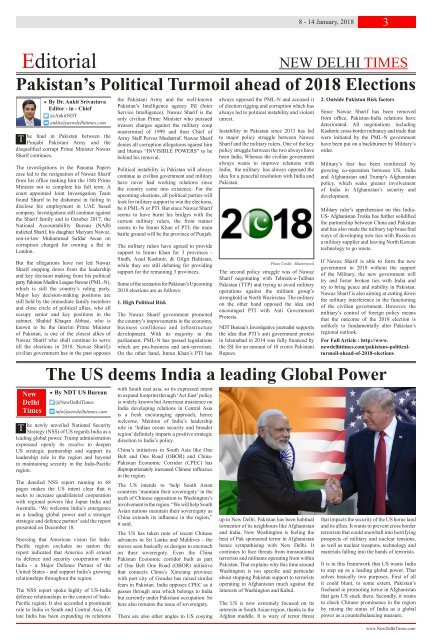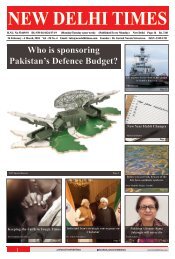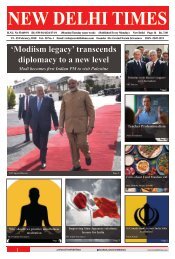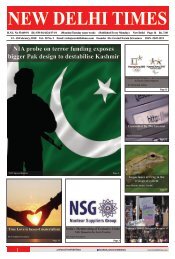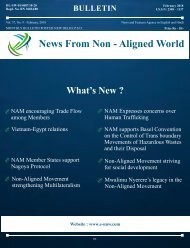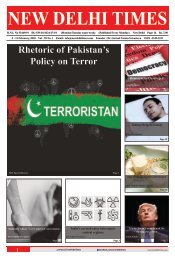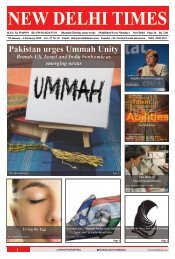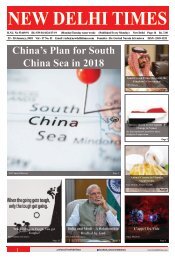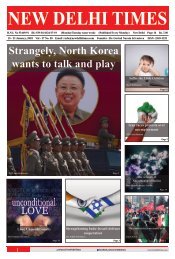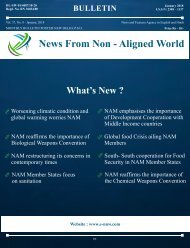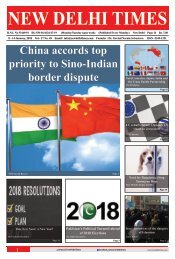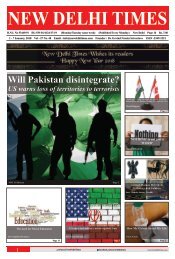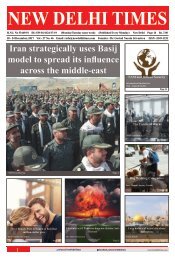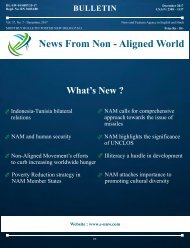8-14 January 2018 - 16-min
You also want an ePaper? Increase the reach of your titles
YUMPU automatically turns print PDFs into web optimized ePapers that Google loves.
8 - <strong>14</strong> <strong>January</strong>, <strong>2018</strong> 3<br />
Editorial<br />
NEW DELHI TIMES<br />
Pakistan’s Political Turmoil ahead of <strong>2018</strong> Elections<br />
T<br />
◆◆<br />
By Dr. Ankit Srivastava<br />
Editor - in - Chief<br />
@AnkitNDT<br />
ankits@newdelhitimes.com<br />
he feud in Pakistan between the<br />
Punjabi Pakistani Army and the<br />
disqualified corrupt Prime Minister Nawaz<br />
Sharif continues.<br />
The investigations in the Panama Papers<br />
case led to the resignation of Nawaz Sharif<br />
from his office making him the 18th Prime<br />
Minister not to complete his full term. A<br />
court appointed Joint Investigation Team<br />
found Sharif to be dishonest in failing to<br />
disclose his employment in UAE based<br />
company. Investigations still continue against<br />
the Sharif family and in October 2017, the<br />
National Accountability Bureau (NAB)<br />
indicted Sharif, his daughter Maryam Nawaz,<br />
son-in-law Muhammad Safdar Awan on<br />
corruption charged for owning a flat in<br />
London.<br />
But the allegations have not led Nawaz<br />
Sharif stepping down from the leadership<br />
and key decision making from his political<br />
party Pakistan Muslim League-Nawaz (PML-N),<br />
which is still the country’s ruling party.<br />
Major key decision-making positions are<br />
still held by the immediate family members<br />
and close circle of political allies, who all<br />
occupy senior and key positions in the<br />
cabinet. Shahid Khaqan Abbasi, who is<br />
known to be the interim Prime Minister<br />
of Pakistan, is one of the closest allies of<br />
Nawaz Sharif who shall continue to serve<br />
till the elections in <strong>2018</strong>. Nawaz Sharif;s<br />
civilian government has in the past opposes<br />
T<br />
◆◆By NDT US Bureau<br />
@NewDelhiTimes<br />
info@newdelhitimes.com<br />
the Pakistani Army and the well-known<br />
Pakistan’s Intelligence agency ISI (Inter<br />
Service Intelligence). Nawaz Sharif is the<br />
only civilian Prime Minister who pursued<br />
treason charges against the military coup<br />
master<strong>min</strong>d of 1999 and then Chief of<br />
Army Staff Pervez Musharraf. Nawaz Sharif<br />
denies all corruption allegations against him<br />
and blames “INVISIBLE POWERS” to be<br />
behind his removal.<br />
Political instability in Pakistan will always<br />
continue as civilian government and military<br />
have never had working relations since<br />
the country came into existence. For the<br />
upco<strong>min</strong>g elections, all political parties will<br />
look for military support to win the elections,<br />
be it PML-N or PTI. But since Nawaz Sharif<br />
seems to have burnt his bridges with the<br />
current military rulers, the front runner<br />
seems to be Imran Khan of PTI; the main<br />
battle ground will be the province of Punjab.<br />
The military rulers have agreed to provide<br />
support to Imran Khan for 3 provinces -<br />
Sindh, Azad Kashmir, & Gilgit Baltistan,<br />
while they are still debating for providing<br />
support for the remaining 3 provinces.<br />
Some of the scenarios for Pakistan’s Upco<strong>min</strong>g<br />
<strong>2018</strong> elections are as follows:<br />
1. High Political Risk<br />
The Nawaz Sharif government promoted<br />
the country’s improvements in the economy,<br />
business confidence and infrastructure<br />
development. With its majority in the<br />
parliament, PML-N has passed legislations<br />
which are pro-business and anti-terrorism.<br />
On the other hand, Imran Khan’s PTI has<br />
always opposed the PML-N and accused it<br />
of election rigging and corruption which has<br />
always led to political instability and violent<br />
unrest.<br />
Instability in Pakistan since 2013 has led<br />
to major policy struggle between Nawaz<br />
Sharif and the military rulers. One of the key<br />
policy struggle between the two always have<br />
been India. Whereas the civilian government<br />
always wants to improve relations with<br />
India, the military has always opposed the<br />
idea for a peaceful resolution with India and<br />
Pakistan.<br />
Photo Credit : Shutterstock<br />
The second policy struggle was of Nawaz<br />
Sharif negotiating with Tehreek-e-Taliban<br />
Pakistan (TTP) and trying to avoid military<br />
operations against the militant group’s<br />
stronghold in North Waziristan. The military<br />
on the other hand opposed the idea and<br />
encouraged PTI with Anti Government<br />
Protests.<br />
NDT Bureau’s Investigative journalist supports<br />
the idea that PTI’s anti government protest<br />
in Islamabad in 20<strong>14</strong> was fully financed by<br />
the ISI for an amount of 10 crores Pakistani<br />
Rupees.<br />
2. Outside Pakistan Risk factors<br />
Since Nawaz Sharif has been removed<br />
from office, Pakistan-India relations have<br />
deteriorated. All negotiations including<br />
Kashmir, cross-border militancy and trade that<br />
were initiated by the PML-N government<br />
have been put on a backburner by Military’s<br />
order.<br />
Military’s fear has been reinforced by<br />
growing co-operation between US, India<br />
and Afghanistan and Trump’s Afghanistan<br />
policy, which seeks greater involvement<br />
of India in Afghanistan’s security and<br />
development.<br />
Military ruler’s apprehension on this India-<br />
US- Afghanistan Troika has further solidified<br />
the partnership between China and Pakistan<br />
and has also made the military top brass find<br />
ways of developing new ties with Russia as<br />
a military supplier and leaving North Korean<br />
technology to go waste.<br />
If Nawaz Sharif is able to form the new<br />
government in <strong>2018</strong> without the support<br />
of the Military, the new government will<br />
try and foster broken ties with India and<br />
try to bring peace and stability in Pakistan.<br />
Nawaz Sharif is also ai<strong>min</strong>g at cutting down<br />
the military interference in the functioning<br />
of the civilian government. However, the<br />
military’s control of foreign policy means<br />
that the outcome of the <strong>2018</strong> election is<br />
unlikely to fundamentally alter Pakistan’s<br />
regional outlook.<br />
For Full Article : http://www.<br />
newdelhitimes.com/pakistans-politicalturmoil-ahead-of-<strong>2018</strong>-elections<br />
The US deems India a leading Global Power<br />
he newly unveiled National Security<br />
Strategy (NSS) of US regards India as a<br />
leading global power. Trump ad<strong>min</strong>istration<br />
expressed openly its resolve to deepen<br />
US strategic partnership and support its<br />
leadership role in the region and beyond<br />
in maintaining security in the Indo-Pacific<br />
region.<br />
The detailed NSS report running to 68<br />
pages makes the US intent clear that it<br />
seeks to increase quadrilateral cooperation<br />
with regional powers like Japan India and<br />
Australia. ‘We welcome India’s emergence<br />
as a leading global power and a stronger<br />
strategic and defence partner’ said the report<br />
presented on December 18.<br />
Stressing that American vision for Indo-<br />
Pacific region excludes no nation the<br />
report indicated that America will extend<br />
its defence and security cooperation with<br />
India - a Major Defence Partner of the<br />
United States - and support India’s growing<br />
relationships throughout the region.<br />
The NSS report spoke highly of US-India<br />
defence relationships in the context of Indo-<br />
Pacific region. It also accorded a pro<strong>min</strong>ent<br />
role to India in South and Central Asia. Of<br />
late India has been expanding its relations<br />
with South east asia, so its expressed intent<br />
to expand footprint through ‘Act East’ policy<br />
is widely known but American insistence on<br />
India developing relations in Central Asia<br />
is a fresh encouraging approach, hence<br />
welcome. Mention of India’s leadership<br />
role in ‘Indian ocean security and broader<br />
region’ definitely imparts a positive strategic<br />
direction to India’s policy.<br />
China’s initiatives in South Asia like One<br />
Belt and One Road (OBOR) and China-<br />
Pakistan Economic Corridor (CPEC) has<br />
disproportionately increased Chinese influence<br />
in the region.<br />
The US intends to ‘help South Asian<br />
countries ‘maintain their sovereignty’ in the<br />
teeth of Chinese opposition to Washington’s<br />
involvement in the region. “We will help South<br />
Asian nations maintain their sovereignty as<br />
China extends its influence in the region,”<br />
it said.<br />
The US has taken note of recent Chinese<br />
advances in Sri Lanka and Maldives - the<br />
moves seen basically as designs to encroach<br />
on their sovereignty. Even the China<br />
Pakistan Economic corridor built as part<br />
of One Belt One Road (OBOR) initiative<br />
that connects China’s Xinxiang province<br />
with port city of Gwadar has raised similar<br />
fears in Pakistan. India opposes CPEC as it<br />
passes through area which belongs to India<br />
but currently under Pakistani occupation. So<br />
here also remains the issue of sovereignty.<br />
There are also other angles to US cosying<br />
up to New Delhi. Pakistan has been habitual<br />
tormentor of its neighbours like Afghanistan<br />
and India. Now Washington is feeling the<br />
heat of Pak sponsored terror in Afghanistan<br />
hence sympathising with New Delhi. It<br />
continues to face threats from transnational<br />
terrorists and militants operating from within<br />
Pakistan. That explains why this time around<br />
Washington is too specific and particular<br />
about stopping Pakistan support to terrorists<br />
operating in Afghanistan much against the<br />
interests of Washington and Kabul.<br />
The US is now extremely focused on its<br />
interests in South Asian region, thanks to the<br />
Afghan muddle. It is wary of terror threat<br />
that impacts the security of the US home land<br />
and its allies. It wants to prevent cross border<br />
terrorism that could snowball into horrifying<br />
prospects of military and nuclear tensions,<br />
as well as nuclear weapons, technology and<br />
materials falling into the hands of terrorists.<br />
It is in this framework that US wants India<br />
to step up as a leading global power. That<br />
solves basically two purposes. First of all<br />
it could blunt, to some extent, Pakistan’s<br />
freehand in promoting terror in Afghanistan<br />
that gets US stuck there. Secondly, it wants<br />
to check Chinese pro<strong>min</strong>ence in the region<br />
by raising the status of India as a global<br />
power as a counterbalancing measure.<br />
www.NewDelhiTimes.com


